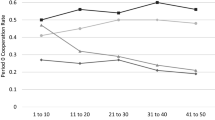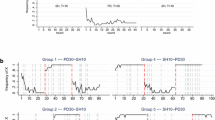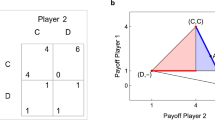Abstract
We introduce a novel mechanism to eliminate endgame effects in repeated prisoner’s dilemma experiments. In the main phase of a supergame our mechanism generates more persistent cooperation than finite horizon or random continuation rules. Moreover, we find evidence for cooperation-enhancing “active/reactive” strategies which concentrate in the initial phase of a supergame as subjects gain experience.
Similar content being viewed by others
References
Andreoni J., Miller J. H. (1993) Rational cooperation in the finitely repeated prisoners’ dilemma: Experimental evidence. Economic Journal 103: 570–585
Axelrod R. (1984) The evolution of cooperation. Basic Books, New York
Binmore K. G. (1992) Fun and games. D.C. Heath, Lexington, MA
Binmore K. G., Samuelson L. (1992) Evolutionary stability in repeated games played by finite automata. Journal of Economic Theory 57: 278–305
Bohnet I., Huck S. (2004) Repetition and reputation: Implications for trust and trustworthiness when institutions change. American Economic Review, Papers and Proceedings of the One Hundred Sixteenth Annual Meeting 94(2): 362–366
Brosig, J., Riechmann, T., & Weimann, J. (2007). Selfish in the End? An investigation of consistency and stability of individual behavior. Munich Personal RePEc Archive 2035.
Camera G., Casari M. (2009) Cooperation among strangers under the shadow of the future. American Economic Review 99(3): 979–1005
Camera, G., Casari, M., & Bigoni, M. (2010). Cooperative strategies in groups of strangers: An experiment. Working Paper.
Dal Bó P. (2005) Cooperation under the shadow of the future: Experimental evidence from infinitely repeated games. American Economic Review 95(5): 1591–1604
Engle-Warnick J., Slonim R. L. (2004) The evolution of strategies in a repeated trust game. Journal of Economic Behavior and Organization 55: 553–573
Engle-Warnick J., Slonim R. L. (2006) Inferring repeated-game strategies from actions: Evidence from trust game experiments. Economic Theory 28: 603–632
Fischbacher U. (2007) z-Tree: Zurich toolbox for ready-made economic experiments. Experimental Economics 10(2): 171–178
Greif A. (1993) Contract enforceability and economic institutions in early trade: The Maghribi traders’ coalition. American Economic Review 83(3): 525–548
Normann, H., & Wallace, B. (2010). The impact of the termination rule on cooperation in a prisoner’s dilemma experiment. Working Paper.
Selten R., Chmura T. (2008) Stationary concepts for experimental 2 × 2 games. American Economic Review 98(3): 938–966
Selten R., Stoecker R. (1986) End behavior in sequences of finite prisoner’s dilemma supergames. Journal of Economic Behavior and Organization 7: 47–70
Selten R., Mitzkewitz M., Uhlich G. R. (1997) Duopoly strategies programmed by experienced players. Econometrica 65(3): 517–555
Author information
Authors and Affiliations
Corresponding author
Electronic Supplementary Material
The Below is the Electronic Supplementary Material.
Rights and permissions
About this article
Cite this article
Bruttel, L., Kamecke, U. Infinity in the lab. How do people play repeated games?. Theory Decis 72, 205–219 (2012). https://doi.org/10.1007/s11238-011-9247-6
Published:
Issue Date:
DOI: https://doi.org/10.1007/s11238-011-9247-6




